

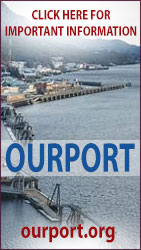















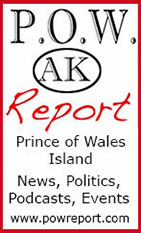

 Contact Contact 
 Webmail
Letters Webmail
Letters
 News Tips News Tips
 Copyright Info Copyright Info
 Archives Archives
Quick News
Search
 Alaska Alaska
 Ketchikan Ketchikan
 SE Alaska SE Alaska
Columns
- Articles
 Dave Kiffer Dave Kiffer
 Money Matters Money Matters
Historical
Ketchikan
 June Allen June Allen
 Dave
Kiffer Dave
Kiffer
 Louise
B. Harrington Louise
B. Harrington
Sports
 Ketchikan Links Ketchikan Links
Public Records
 FAA Accident Reports FAA Accident Reports
 NTSB
Accident Reports NTSB
Accident Reports
 Court Calendar Court Calendar
 Recent Filings & Case Dispositions Recent Filings & Case Dispositions
 Court Records Search Court Records Search
 Sex Offender Reg. Sex Offender Reg.
 Public Notices Public Notices
 Alaska Recall Alerts Alaska Recall Alerts
 Recalls.gov Recalls.gov
 AST Daily Dispatch AST Daily Dispatch
 KTN
Police Reports KTN
Police Reports
 Juneau Police Reports Juneau Police Reports
Weather,
Webcams
 Today's
Forecast Today's
Forecast
 KTN
Weather Data KTN
Weather Data
 AK
Weather Map AK
Weather Map
 AK Weathercams AK Weathercams
 AK Earthquakes AK Earthquakes

|
|

Saturday
January 25, 2020
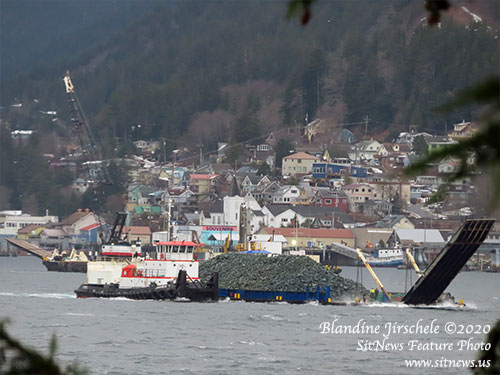
|
The ‘James T’ pushing a barge load of debris from the Pinnacle blasting, for disposal.
For more about this blasting, click here.
Front Page Feature Photo By BLANDINE JIRSCHELE ©2020
To have your photo featured on the front page,
email your photo(s) to editor@sitnews.us
|
| |
|
Fish Factor: Economic Value of Alaska's Seafood Industry By LAINE WELCH - Which Alaska region is home to the most fishing boats and where do most of Alaska’s fishermen live?
Answers to those questions and many others can be found in the annual report Economic Value of Alaska’s Seafood Industry 2020 by the Alaska Seafood Marketing Institute (ASMI). The colorful, easy to read report, prepared by the McDowell Group, gives a fishing snapshot by Alaska region, including employment rates and tax revenues, and breaks down the industry’s impacts to the nation and the world.
Here are some highlights:
The seafood industry contributed $5.6 billion in economic output to Alaska’s economy in 2017/2018, including harvesting, processing, and support sectors.
About 58,700 workers were directly employed by Alaska’s seafood industry, earning $1.7 billion in wages annually.
There were 29,400 skippers, active permit owners and crew who fished in Alaska, of which 16,319 (56%) were Alaska residents.
Most of Alaska’s fishermen (38%) live in the Southcentral region, more than any other area.
Alaska processors employed 26,000 workers on average at 166 shore based plants, 49 catcher processors and 10 large floating processors. Most fish is sold by processors as headed/gutted whole fish (41%) followed by fillets (20%), surimi (13%) , roe (10%), canned (5%) and only 3% for meal/oils.
Alaska is home to over 9,000 fishing vessels. More than one third (3,259) are in the 23-32 foot range; 2,206 boats range from 33-49 feet in length.
Southeast Alaska is home to 2,462 fishing boats, nearly a quarter of the statewide fleet and more than any other region.
Nearly 5.7 billion pounds of seafood worth $2 billion at the docks was harvested in 2017/2018 fisheries. Processors turned it into 2.8 billion pounds of product worth $4.7 billion.
Salmon was the most valuable catch for fishermen at $744 million, followed by Alaska pollock at $461 million.
Alaska pollock accounts for 44% of the global supply; Alaska salmon accounts for just 13% of global supply.
The Bering Sea/Aleutian Islands region accounts for 55% of Alaska’s fishery value and 81% of the volume.
Bristol Bay typically accounts for 42% of the world’s sockeye salmon harvest.
Seafood industry tax revenues topped $172 million in 2018 of which 43% went to the state, ($73 million), 30% to local governments ($51 million), 23% to salmon hatchery management ($40 million), and 5% to the federal government ($8 million).
Seven of the 10 largest shoreside processors invested a total of over $100 million per year in capital expenditures from 2012 to 2016 and spending has continued to increase.
Alaska’s fishing fleet also has expanded. An average of 75 new boats were added to the fleet annually from 2013-2018, an average investment of more than $50 million per year.
Alaska produces two-thirds of the nation’s seafood harvest and is home to nine of the top 20 U.S. ports for value. Seafood also is Alaska’s biggest and most valuable export at over $3 billion, going to 97 countries in 2018.
The economic impacts of Alaska’s seafood industry are sustained without one penny of support from the state. ASMI, the lone marketing arm, is funded entirely by an industry-paid 5% marketing assessment based on the dockside value of the catches and federal funding for American export industries. - More...
Saturday PM - January 25, 2020
|
|
Alaska: Joint Session to Override Governor’s Vetoes Falls Short of the Required Three-quarter Vote Threshold - The Alaska Legislature held a joint floor session Friday to consider an override of two of the governor’s major FY2020 budget vetoes.
Lawmakers voted on a measure to restore a $5 million investment the Legislature made in the Alaska Marine Highway System, and to fulfill the state’s promise to reimburse communities that issue bonds to construct and improve schools.
While a majority in the Alaska House and Senate voted to override the vetoes (37-to-20) the vote fell short of the three-quarter threshold needed to restore the funding.
“Alaskans deserve to know where their elected officials stand,” House Speaker Bryce Edgmon (I-Dillingham) said of the vote. “Today, we saw clearly that most legislators stand with the Alaska Marine Highway System, and for keeping the financial commitments the state made to local communities. I want Alaskans to know unequivocally that last year’s budget is not the new normal. The governor’s vision does not support the level of services it takes to build the Alaska our children and elders deserve.”
Efforts to restore funding for Alaska Marine Highway System, school bond debt reimbursement, and other key services threatened by recent budget cuts will continue immediately through the supplemental budget process and in the FY2021 budget.
House Speaker Bryce Edgmon (I-Dillingham) and Senate President Cathy Giessel (R-Anchorage) in a January 23rd joint press release announced that the Alaska Legislature would hold a joint floor session on Friday - January 24th to consider an override of vetoes made by the governor in the FY2020 budget.
House Minority Leader Lance Pruitt (R-Anchorage) issued a statement after what he called Friday's surprise joint session to take up budget veto overrides.
Pruitt said, “As the House Majority clearly stated in their press release after the joint session, [Friday's] vote was about nothing more than creating material to use against other members in the next election cycle. The House and Senate leadership knew that they didn’t have the votes to be successful, yet they moved forward anyway, failing to consider the concerns of conservatives who are serious about being guardians of good government and fiscal restraint." - More...
Saturday PM - January 25, 2020
Alaska: DOC reverses course, cancels plan to send prisoners out-of-state - Alaska Department of Corrections Commissioner Nancy Dahlstrom informed the House State Affairs Committee (Video) on Thursday that the state is canceling a plan to spend millions of dollars to send nearly 500 prisoners to Outside, private facilities.
The Department of Corrections also announced a plan to re-open the Palmer Correctional Complex (“PCC”) and to create additional re-entry programs.
The Dunleavy Administration’s change of direction followed the introduction of Rep. Zack Fields’ House Bill 187, legislation that would prohibit the state from sending Alaskan prisoners out-of-state.
“DOC’s decision to cancel the shipment of prisoners Outside is a victory for the many Alaskans who are advocating improvements to re-entry services so that people are more likely to be successful when they leave jail and re-integrate into our communities,” said Representative Fields, an Anchorage Democrat. “This outcome saves money and will help make Alaska safe by keeping gangs out of our state.” - More...
Saturday PM - January 25, 2020 |
|
Fisheries: Fisheries management is actually working, global analysis shows - Nearly half of the fish caught worldwide are from stocks that are scientifically monitored and, on average, are increasing in abundance. Effective management appears to be the main reason these stocks are at sustainable levels or successfully rebuilding.
That is the main finding of an international project led by the University of Washington to compile and analyze data from fisheries around the world. The results were published Jan. 13 in the Proceedings of the National Academy of Sciences.
"There is a narrative that fish stocks are declining around the world, that fisheries management is failing and we need new solutions -- and it's totally wrong," said lead author Ray Hilborn, a professor in the UW School of Aquatic and Fishery Sciences. "Fish stocks are not all declining around the world. They are increasing in many places, and we already know how to solve problems through effective fisheries management."
The project builds on a decade-long international collaboration to assemble estimates of the status of fish stocks -- or distinct populations of fish -- around the world. This information helps scientists and managers know where overfishing is occurring, or where some areas could support even more fishing. Now the team's database includes information on nearly half of the world's fish catch, up from about 20% represented in the last compilation in 2009.
"The key is, we want to know how well we are doing, where we need to improve, and what the problems are," Hilborn said. "Given that most countries are trying to provide long-term sustainable yield of their fisheries, we want to know where we are overfishing, and where there is potential for more yield in places we're not fully exploiting."
Over the past decade, the research team built a network of collaborators in countries and regions throughout the world, inputting their data on valuable fish populations in places such as the Mediterranean, Peru, Chile, Russia, Japan and northwest Africa. Now about 880 fish stocks are included in the database, giving a much more comprehensive picture worldwide of the health and status of fish populations.
Still, most of the fish stocks in South Asia and Southeast Asia do not have scientific estimates of health and status available. Fisheries in India, Indonesia and China alone represent 30% to 40% of the world's fish catch that is essentially unassessed.
"There are still big gaps in the data and these gaps are more difficult to fill," said co-author Ana Parma, a principal scientist at Argentina's National Scientific and Technical Research Council and a member of The Nature Conservancy global board. "This is because the available information on smaller fisheries is more scattered, has not been standardized and is harder to collate, or because fisheries in many regions are not regularly monitored."
The researchers paired information about fish stocks with recently published data on fisheries management activities in about 30 countries. This analysis found that more intense management led to healthy or improving fish stocks, while little to no management led to overfishing and poor stock status.
These results show that fisheries management works when applied, and the solution for sustaining fisheries around the world is implementing effective fisheries management, the authors explained. - More...
Saturday PM - January 25, 2020
|
|
Arctic: Climate gas budgets highly overestimate methane discharge from Arctic Ocean - The atmospheric concentration of methane, a potent greenhouse gas, has almost tripled since the beginning of industrialisation. Methane emissions from natural sources are poorly understood. This is especially the case for emissions from the Arctic Ocean.
The Arctic Ocean is a harsh working environment. That is why many of the scientific expeditions, are conducted in the summer and early autumn months, when the weather and the waters are more predictable. Most extrapolations regarding the amount of methane discharge from the ocean floor, are thus based on observations made in the warmer months.
"This means that the present climate gas calculations are disregarding the possible seasonal temperature variations. We have found that seasonal differences in bottom water temperatures in the Arctic Ocean vary from 1,7°C in May to 3,5°C in August. The methane seeps in colder conditions decrease emissions by 43 percent in May compared to August." says oceanographer Benedicte Ferré, researcher at CAGE Centre for Arctic Gas Hydrate, Environment and Climate at UiT The Arctic University of Norway.
"Right now, there is a large overestimation in the methane budget. We cannot just multiply what we find in August by 12 and get a correct annual estimate. Our study clearly shows that the system hibernates during the cold season." - More...
Saturday PM - January 25, 2020
Alaska - NW: IPHC Requests Charter Tenders For The 2020 Fishery-independent Setline Survey - The International Pacific Halibut Commission (IPHC) is seeking to charter longline vessels to conduct its fisheries-independent setline survey (FISS) in 2020. The purpose of the FISS is to collect standardized data for use in the Pacific halibut stock assessment. This information is used to study aspects of the Pacific halibut resource such as growth, distribution, biomass, age composition, sexual maturity, and relative abundance of other species. Legal-sized Pacific halibut from all skates and some bycatch will be retained, sampled for biological data, and sold by the IPHC to offset FISS expenses. |
|
The 2020 FISS will cover 28 charter regions within the IPHC Convention Area with a standard grid of stations from Oregon to the northern Bering Sea, including the Aleutian Islands. The FISS must be completed between 23 May and 31 August 2020. All regions are open for single-year bids.
The IPHC will consider only those vessels with captains and crews that have recent (within five years) Pacific halibut fishing experience. The IPHC may require an inspection of the vessel prior to awarding the charter.
Vessels need not be licensed for Pacific halibut fishing in Canada or the USA to be eligible. The IPHC is not restricted as to nationality of the vessels it charters for operation in any region as long as customs and immigration regulations are followed. - More...
Saturday PM - January 25, 2020
Analysis: Precedent? Nah, the Senate gets to reinvent its rules in every impeachment By KIRSTEN CARLSON - Everybody seems to be using the word “precedent” right now.
Commentators, the media and even Senate Majority Leader Mitch McConnell use it when they discuss or debate the appropriate procedures for President Donald Trump’s impeachment trial.
The word has multiple meanings, though, so what people mean by “precedent” is often unclear and confusing.
Binding or just a guide
The word “precedent” has a technical legal meaning and a common one.
Legally, it is a term of art that refers to a rule established in a court case. That rule is either binding or persuasive for other courts in deciding later cases with similar issues or facts.
Simply put, legal precedents obligate courts to follow the same rule and often determine the outcome in a similar case.
In common parlance, however, precedent has a different meaning.
In this use, it refers to an earlier event or action that is regarded as an example or guide to be considered in similar circumstances. This kind of precedent is nonbinding and merely instructive.
When a trial doesn’t set precedent
Unlike a court of law, prior impeachment trials serve as precedent only in the nonlegal, nonbinding sense.
The Senate can look to the procedures it has used in past impeachment proceedings, but those procedures do not have to be followed.
The Constitution gives very little guidance on how an impeachment trial should proceed. Article I, Section 3, Clause 6 states, “The Senate shall have the sole Power to try all Impeachments.”
After requiring that Senators be “on oath,” that the chief justice preside and that a two-thirds vote is required to convict, the Constitution leaves it to the Senate to make its own rules about how to conduct the trial. - More...
Saturday PM - January 25, 2020
|
DAVE KIFFER: My Own Personal SPAM-a-Lot! - Gosh, I LOVE SPAM!
No, not the "canned cooked pork."
Although, growing up in Alaska did give me an appreciation for that versatile food.
When you spend massive amounts of time on a fishing boat you learn quickly that "great things come in cans."
Especially when you spend a fair amount of time abandoning said fishing boats in the middle of the night and even more time cleaning out the waterlogged fo's'cles of said boats afterwards, you learn how awesome it is to have cans of a specific shape that you can identify long after the label has washed away!
Above all you learn that there is absolutely no meal that can't be improved by slapping a big slab of "pork shoulder, water, salt, modified potato starch, sugar and sodium nitrate" on it. In the 50th state, they call SPAM "Hawaiian Steak." In the 49th state, it is called "Alaskan Bologna (baloney)."
But, as usual, I digress.
What I really love is online SPAM. - More....
Saturday PM - January 25, 2020
JEFF LUND: Waders half empty - Maybe I’m the only one who felt it, but maybe I’m not. When the rains came and cleansed the streets of dirty ice, my soul rejoiced for spring cometh. Well it will, eventually. It’s not that I felt like spring was eminent, but it is inevitable and I couldn’t help feel the optimism that comes with a day that feels more like late February than late January. Because after February is March then comes April then comes May. Then come the tourists, but it’s hard to beat March, April and May around here. Warmer rain (not warm Arizona monsoon rain, just less cold rain), more daylight hours for the warmer rain, symbolism about rebirth and life and all that stuff. It’s awesome, and to get a little taste of it in January isn’t ridiculous.
The thing is I grew up around here, so I know better than to think we have winter kicked. At the same time though, it’s not just knowing better, it’s also understanding and appreciating that going from clear, cold and beautiful (unless you’re driving) to dark and rainy isn’t a step back, it’s just what happens around here. You don’t just hit pause until things are nice and convenient. It you wanted that, you’d live in California and pretend you didn’t mind the traffic. - More...
Saturday PM - January 25, 2020
MICHAEL REAGAN: The New Rules of Impeachment - I must have said it a dozen times since the Democrats’ impeachment miniseries took over our televisions, but I’ll say it again.
The Democrats and their allies in the liberal media think history began this morning when they rolled out of the left side of their beds.
It happened again during the Democrats’ opening impeachment tirades in the Senate.
Democrats are still wasting our time – and ignoring their jobs – trying to prove that President Trump should be impeached because he abused the power of his office and because he obstructed Congress by claiming executive privilege.
The obstruction charges against Trump are for refusing to let administration officials testify before the impeachment hearings in the House and for withholding documents the House had requested. - More...
Saturday PM - January 25, 2020 |
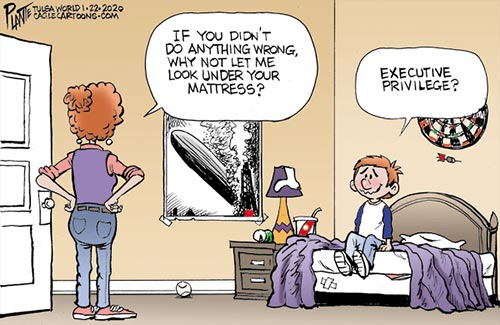
Political Cartoon: Impeachment trial at home
By Bruce Plante ©2020, Tulsa World
Distributed to paid subscribers for publication by Cagle Cartoons, Inc. |
A Practice in Health By John Cross - Under the Affordable Care Act, hospitals are required to publish detailed financial reports. One report hospitals are required to release is called the: Schedule H Form. The Schedule H Form outlines how much money-losing care hospitals offer to their patients; hospitals refer to this number as their “charity care” (Internal Revenue Service, 2019). Hospitals, in exchange for receiving tax breaks at the State, Local, and Federal level, are expected to provide a reasonable amount of charity care (Government Accountability Office, 2018). The City of Ketchikan’s hospital lease with PeaceHealth expires in 2023. This paper will argue that the City of Ketchikan should examine PeaceHealth’s local and corporate practices before extending PeaceHealth’s hospital lease.
Corporate Outlook.
At the corporate level, PeaceHealth’s fiscal situation is the envy of hospitals across the nation. PeaceHealth’s operating margin is well ahead of its peers in the hospital industry. In 2018, the standard operating margin for a not-for-profit hospital was 2.1 percent (Paavola, 2019), PeaceHealth’s 2018 operating margin was 3.4 percent, nearly two-thirds above its hospital companions in the not-for-profit class (Willig et al. 2019).
PeaceHealth has managed to expand its profit margin by charging higher prices to patients and their insurance networks. These higher prices have resulted in record profits year after year. In the last two years alone PeaceHealth has generated ?untaxed? profits of over half a billion dollars. PeaceHealth averages 133 million dollars of untaxed “net income”, or profits, each year (Figure 1).
How has PeaceHealth become so profitable? Well, one likely explanation is the Affordable Care Act. Federal law requires hospitals to provide medical treatment to all patients regardless of their ability to pay. Before the Affordable Care Act, low income and uninsured patients often could not afford their hospital bills, forcing hospitals to provide large amounts of free medical care. - More...
Saturday PM - January 25, 2020
Cripple Iran's Strategic Weapons By Donald Moskowitz - In a New Hampshire Union Leader oped Dr. Jessica Tuchman Mathews described why the Trump administration should continue the Iranian nuclear agreement. She delved into the value of the agreement and how the U.S. and the world were relatively safe from a nuclear attack by Iran for 15 years if the agreement remained in force. This was terrible thinking.
Dr. Mathews and other proponents of the agreement believed the international surveillance program designed to monitor Iran's compliance with the agreement would ensure Iran could not develop its nuclear arms program. This was a theoretical fantasy. Iran hides its nuclear weapons development activities from international surveillance systems, and Iran continues to expand its nuclear arsenal. Thankfully, President Trump exited the agreement.
Iran is a primary sponsor of radical Islamic terrorism. It wants to spread its virulent anti-Western Islamic Fascism throughout the Middle East, and Iran and its proxies are threatening and attacking our military forces in the region. - More...
Saturday PM - January 25, 2020
AMHS Reshaping Draft Report By A. M. Johnson - Regarding the long awaited for report on the future status of the Alaska Marine Highway System, I first was furious at the content as I thought of the thousands of dollars spent on this result.
Early, I mentioned to a local retired ferry system Master that a few of the retired and active Captains of the system sitting down at the Pioneer Café over coffee and home baked goodies from hostest "Libby", would have produced on the back of a napkin, a better outcome. - More...
Monday AM - January 20, 2020
Email letters, opinions, OPEDs to editor@sitnews.us
|
Articles &
photographs that appear in SitNews may be protected by copyright
and may not be reprinted or redistributed without written permission
from and payment of required fees to the proper sources.
E-mail your news &
photos to editor@sitnews.us
Photographers choosing to submit photographs for publication to SitNews are in doing so, granting their permission for publication and for archiving. SitNews does not sell photographs. All requests for purchasing a photograph will be emailed to the photographer.
|
|














The Local Paper is
available online.
Click here for this week's printed edition (PDF)
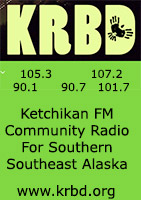

|
|

![]() Contact
Contact ![]()
![]() Webmail
Letters
Webmail
Letters![]()
![]() News Tips
News Tips![]()
![]() Copyright Info
Copyright Info![]() Archives
Archives![]() Alaska
Alaska![]() Ketchikan
Ketchikan![]() SE Alaska
SE Alaska![]() Dave Kiffer
Dave Kiffer![]() Money Matters
Money Matters ![]() June Allen
June Allen![]() Dave
Kiffer
Dave
Kiffer![]() Louise
B. Harrington
Louise
B. Harrington ![]() Ketchikan Links
Ketchikan Links![]() FAA Accident Reports
FAA Accident Reports ![]() NTSB
Accident Reports
NTSB
Accident Reports![]() Court Calendar
Court Calendar![]() Recent Filings & Case Dispositions
Recent Filings & Case Dispositions ![]() Court Records Search
Court Records Search![]() Sex Offender Reg.
Sex Offender Reg.![]() Public Notices
Public Notices![]() Alaska Recall Alerts
Alaska Recall Alerts![]() Recalls.gov
Recalls.gov![]() AST Daily Dispatch
AST Daily Dispatch![]() KTN
Police Reports
KTN
Police Reports![]() Juneau Police Reports
Juneau Police Reports ![]() Today's
Forecast
Today's
Forecast![]() KTN
Weather Data
KTN
Weather Data![]() AK
Weather Map
AK
Weather Map![]() AK Weathercams
AK Weathercams![]() AK Earthquakes
AK Earthquakes








































